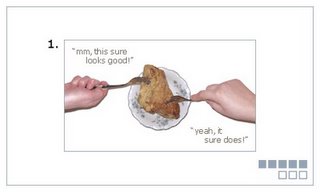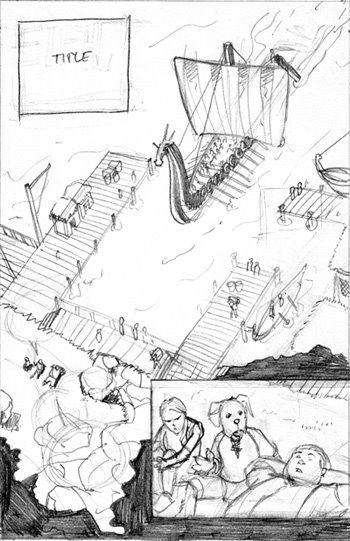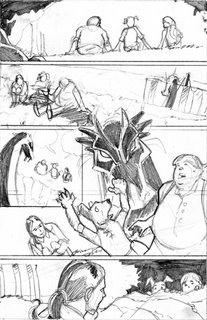Minutes or Millennia: Timing in Comics
 Although this may seem like a panel from a surreal comic about spoons, teacups, and turnovers, it is in fact an illustration from a series of excellent articles on the use of time in comics by Joanna Estep (part 1, part 2).
Although this may seem like a panel from a surreal comic about spoons, teacups, and turnovers, it is in fact an illustration from a series of excellent articles on the use of time in comics by Joanna Estep (part 1, part 2).Watching teacups fly through the air and talking about imaginary time puts me in mind of the sorts of things Stephen Hawking discusses in A Brief History of Time:

"When one tried to unify gravity with quantum mechanics, one had to introduce the idea of “imaginary” time. Imaginary time is indistinguishable from directions in space. If one can go north, one can turn around and head south; equally, if one can go forward in imaginary time, one ought to be able to turn round and go backward. This means that there can be no important difference between the forward and backward directions of imaginary time."
 The ambivalent nature of the direction of time is also true in comics (as well as film, and other sequential media) of course, since they both really run on imaginary (or subjective) time. As Joanna points out, the space between panels can be anything the creator wants: minutes or millennia.
The ambivalent nature of the direction of time is also true in comics (as well as film, and other sequential media) of course, since they both really run on imaginary (or subjective) time. As Joanna points out, the space between panels can be anything the creator wants: minutes or millennia.When I started writing comics, I made a conscious choice to keep the visual storytelling independent of the words. Thus, one can get a sense of the first pages of Elf-Help (I hope) just from the images:


At some point (the end of page 2, actually), I evolved a much looser style, compressing and stretching time (mostly compressing) to better suit the story, like in the opening pages of Old School:



Science...
Part of what is interesting about this to me, and what the articles helped me realize, is that I only play with time when one of the characters within the comic is narrating (Ace telling the story about Strong Arm and the Masher in Old School, or Gerd talking about her uncle's ship in Elf-Help). This sort of thing generally happens on a subconscious, even instinctual level, but it's nice every once in a while to go back to the basics and think about something as fundamental as time and pacing -- there's a lot to be learned, even from yourself.


0 Comments:
Post a Comment
Subscribe to Post Comments [Atom]
<< Home